
When I sat down with EA CEO Andrew Wilson, our conversation started with my kids. These sorts of discussions often start with small talk, but it just so happened that our eldest son recently started playing Star Wars Battlefront II.
I hadn’t intended to kick off the conversation by pressing Wilson on one of his company’s stumbles. But he took it in stride. He’s had to explain the company’s mistakes to shareholders and to his board of directors. Investors are watching EA like a hawk after a disastrous earnings report recently.
Battlefront II was a particularly troubled launch after EA misjudged consumers’ tolerance for gameplay-impacting loot boxes. Developer DICE, amid player ire and critical panning, completely deconstructed and rebuilt the game’s progression system. Wilson saw that costly decision as fulfilling a commitment that EA and DICE had made to players.
“We found ourselves in the middle of a pretty challenging conversation on that one in particular,” Wilson explained. “The game, even at launch, was—I don’t want to go as far as to say a great game—it was a really good game. It had some issues with the progression system, and the team made a lot of promises about what they were going to put into the game. I’d like to believe that a lesser company would have just tossed it and moved on.”
He also touted the game’s 30-point “net promoter score” increase since the game’s launch (more than 25 points of that increase were in the last year). NPS is a measurement of consumer satisfaction ranging from -100 to +100. A score less than 0 indicates that there is more negative consumer sentiment than positive. A result greater than 0 suggests that more of the community feels positively than negatively. An EA spokesperson tells GameDaily that the score today is “well above zero.”
The banter about my kids was the beginning of a discussion that was filled with human moments, as Wilson (in his first interview in a couple of years) admitted to the company’s missteps, explained how EA is recovering from them, and shared why he believes the future is going to be built on all types of games, including (and especially) indies.
It’s easy to look at companies as large as EA and see them as monoliths. EA, under Wilson’s leadership, has been through a period of self-reflection. He sees his company’s culture as a set of habits that people within the organization exhibit.
According to Wilson, individual values lead to needs and motivations, which in turn drive people toward certain actions. Over time, those actions become behaviors and eventually habit. When you put 10,000 people together in a company like EA, those habits become a company’s culture.
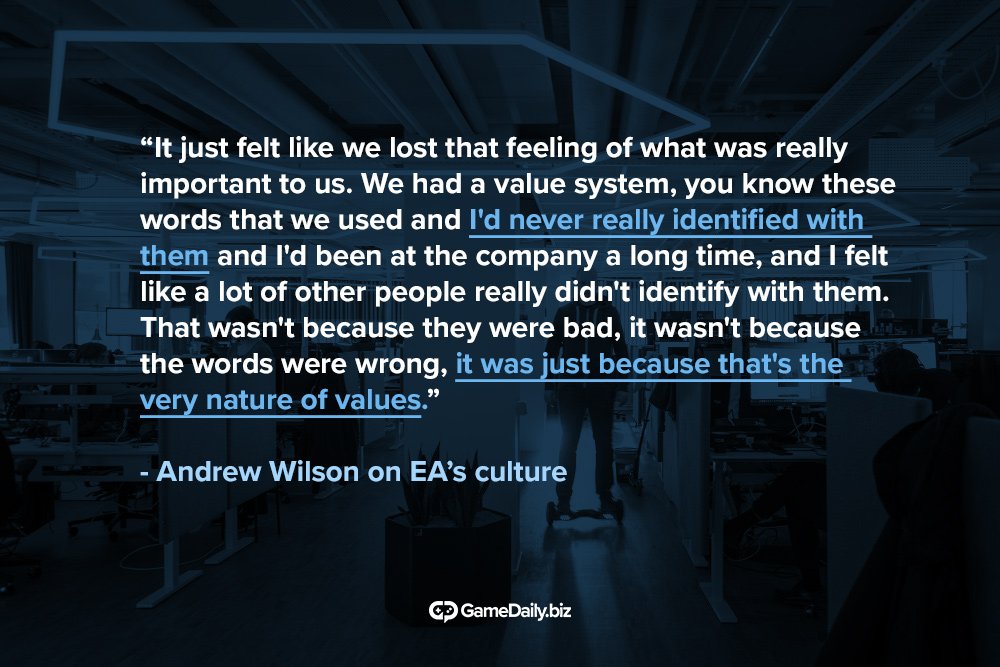
Wilson has been part of EA’s values and habits for nineteen years, leading the company for the last six. Like many others in leadership roles at EA, he came up as a developer. And unlike the CEOs of Activision and Take-Two, he actively plays video games.
Throughout the conversation, he referenced that background and the perspective it gives him to recognize friction between good intentions and sometimes imperfect results. While nearly two decades of employment at the same company culminating in its top leadership position might create myopia, Wilson sees his journey as one of “ups and downs.” He told GameDaily that when he became CEO, he sensed that there was a disconnect between the desire of EA employees individually and collectively to do good and how the company was showing up in the world. In order to reduce that tension, one of Wilson’s early initiatives was overhauling EA’s internal value system.
“It just felt like we lost that feeling of what was really important to us,” Wilson explained. “We had a value system, you know these words that we used and I’d never really identified with them and I’d been at the company a long time, and I felt like a lot of other people really didn’t identify with them. That wasn’t because they were bad, it wasn’t because the words were wrong, it was just because that’s the very nature of values.”
EA spent a year early in Wilson’s tenure as CEO figuring out who it was in today’s video game industry. The end result was a company that refers back to six values, which include creativity and passion, but also encourage risk-taking and learning from the world around it. The EA of today has also shied away from auteurship in favor of teamwork. When the industry and consumers alike think of the great game creators of today, names like Hideo Kojima and Todd Howard come to mind. Wilson suggests that the industry has started moving away from a model that prioritizes a single individual’s vision as an anonymous team toils to bring it to life.
“It doesn’t work that way anymore,” he said. “No doubt there are individuals who have disproportionate impact in the creation of this thing that we do. No doubt in my mind there are very special people, but there are collections of them, and groups of these very special people that come together and do amazing things, and with teamwork you do more.”
Even with a contemporary values system in place, Wilson knows that EA is going to make mistakes. However, having those six pillars in place gives EA’s leadership the means to grade itself against its own ideals.
“We don’t live up to those values each and every day, but we have a framework through which to measure ourselves and drive our behavior and get us towards a better place, and I feel good about that,” Wilson said. “I think what you discover is any time you get a group of people who are passionate about an idea, and it’s a creative idea, and it’s a pioneering idea, there is a better than average chance you are going to get it at least partially wrong on some level.”
Wilson attributes some of the challenge in today’s market to a consumer base growing and shifting demographically. Even when the market was smaller, delivering a hit wasn’t a sure thing. He recounted the tale of a surfing game he worked on that never made it out the door, a game for which he says he was the perfect target demographic. Fast-forward to the present, and EA isn’t afraid to experiment, because Wilson understands that ideas and their execution aren’t going to be perfect. He instead ties the drive to take those imperfect creations and improve them back to the publisher’s value system.
“I think everything we do, we get a bit wrong,” Wilson admits. “In a world where you give absolutely everything you have and typically get something a bit wrong, a lesser organization that didn’t have this core value system would get really down on their self really quickly. The problem with that is, as human beings, once we go into retreat, the things that we hold true as our values—this creativity, and this passion, this pioneering—they’re the things that get thrown out the window first.”
And, according to Wilson, EA’s values system is exactly why it didn’t give up on Star Wars Battlefront II and why BioWare is getting the runway to fix Anthem’s problems.
As the former head of EA Sports, he set that division up for continued success across its FIFA, Madden NFL, and NHL franchises. Those continue to be potent revenue generators, with stable sales and growing recurrent spending for Ultimate Team modes.
Respawn’s Apex Legends started off strong (though slowed over time). A second season starts soon and is likely to spur new battle pass and cosmetic purchases. There are other areas where EA is currently trying to regain its footing, though.
“Making fun is hard,” Wilson told me.
Our conversation shifted from EA’s values to one of its two most recent marquee releases. Anthem made big promises on its way to launch: a BioWare story with cooperative action that many critics likened to Bungie’s Destiny. The game tripped at release, though. BioWare fans were looking for something along the lines of Dragon Age or Mass Effect. Third-person shooter fans loved the flying, but ran out of things to do with their friends. Long load times and bugs left players hungry for content and polish.
Publishers of EA’s size rely on people and technology to gather heaps of research data, including metrics from gameplay and feedback on marketing efforts. No beta test can tell you how a player is going to feel over the long-term in a market that has grown from 10 to 12 hour single-player games to 40-, 80-, or 100-plus-hour experiences. They can only point out the most glaring issues. And even with two weekends of player testing, Anthem’s biggest flaws simply couldn’t be detected.
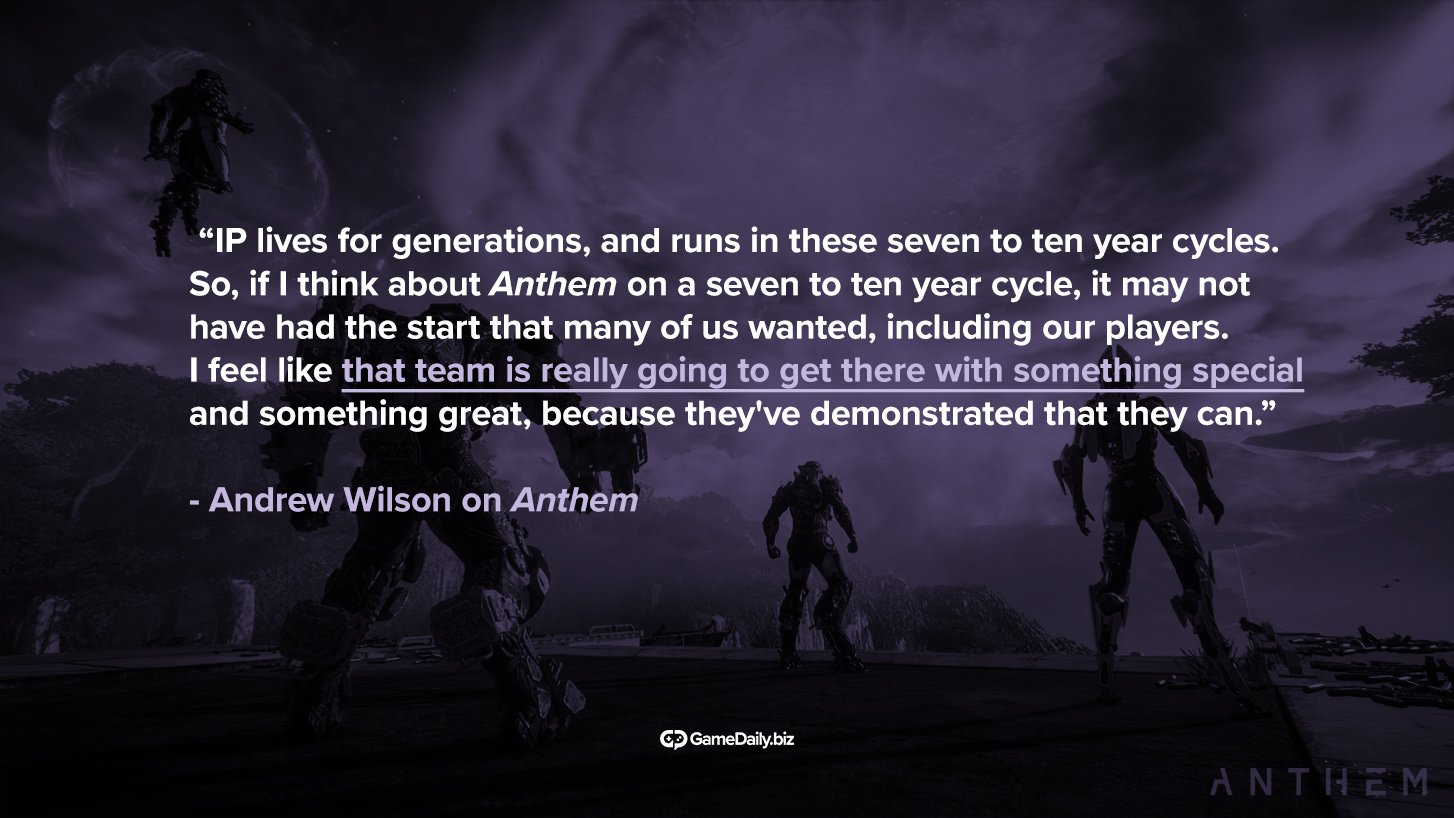
While players reportedly loved the world, the premise, and flying around in the game’s Javelin suits, they fell out of sync with the experience in the late-game. One of BioWare’s biggest challenges was also one of its key selling points: there is something in Anthem for different kinds of players. After about 40 hours of playtime, these different groups began to experience friction with each other and the content. The result was diminishing enjoyment over longer play times.
“We brought together these two groups of players who were making this emotional value calculation on two different vectors,” Wilson explained. “One was traditional BioWare story driven content, and the other was this action-adventure type content. About the 30 or 40 hour mark they really had to come together and start working in on the elder game. At that point everyone kind of went, ‘Oh, hang a minute.’ Now the calculation is off. It’s off because I’ve got a friend who sits in this other category of player. They want to play the game a certain way. I want to play the game a certain way. The promise was we can play together, and that’s not working very well. Oh, by the way I’m used to 100 hours of BioWare story, and that’s not what I got.’ Or, ‘I expected that this game would have meaningfully advanced the action component that we’d seen in games like Destiny before, and I don’t feel like it has.’”
Wilson says that Anthem’s core premise—the nuts and bolts of what the game is built around—make it an easier decision to keep investing. EA is far from ready to pull the plug on BioWare’s foray into cooperative action. Instead, Wilson suggested Anthem’s path forward is similar to Star Wars Battlefront II’s road to redemption, voicing confidence in the world BioWare created as the seed for a long-running franchise.
He likened BioWare’s pedigree to Steven Spielberg’s. Spielberg might not have hit a home run with Ready Player One, but you’d be a fool not to bet on the Indiana Jones director’s next movie. Likewise, Wilson said that he’d bet on BioWare “every day and twice on Sunday,” despite Edmonton’s stumbles with Anthem and (now closed) BioWare Montreal’s challenges with Mass Effect Andromeda.
“If we believed that at the very core the world wasn’t compelling people, if we believed at the very core that the characters weren’t compelling for people, or the Javelin suits weren’t compelling, or traversing the world and participating in the world wasn’t compelling then provided we hadn’t made promises to our players… we might not invest further,” Wilson said. “IP lives for generations, and runs in these seven to ten year cycles. So, if I think about Anthem on a seven to ten year cycle, it may not have had the start that many of us wanted, including our players. I feel like that team is really going to get there with something special and something great, because they’ve demonstrated that they can.”
And in the case of Anthem’s misalignment with player expectations, the only way forward in Wilson’s eyes is to remain committed to the game and its audience. That includes those players who came in looking for a more traditional BioWare experience. And at the same time, he’s cognizant that all of EA’s brands need to grow and adapt as the market and players mature. BioWare is just the latest to push the boundaries, and Wilson sees them being around for years to come.
“What the BioWare teams are thinking about is that we’re going to build a lot of different types of games,” Wilson explained. “We’re going to have our core BioWare audience that’s been with us for a really long time. There are kids today who are 12 years old who weren’t around when BioWare started making games… and they have different expectations of what a BioWare game should be in the context of the world they’ve grown up in. As a result of that, BioWare has to evolve and has to expand and has to test the elasticity of that brand. The teams at BioWare will continue to come to work every day and listen to their players old and new and seek to deliver on the promises they’ve made to those players. That’s what you’re seeing with Anthem today.”
While Anthem didn’t stick the landing, EA and BioWare ensured that it didn’t get hampered with the same negative buzz that plagued the Battlefront II launch. Anthem features no loot boxes, instead offering up cosmetic items on a “what you see is what you get” basis. That doesn’t mean EA is going to abandon the idea of blind box items entirely, though. Wilson points to the company’s sports offerings as having a positive pairing with that form of monetization.
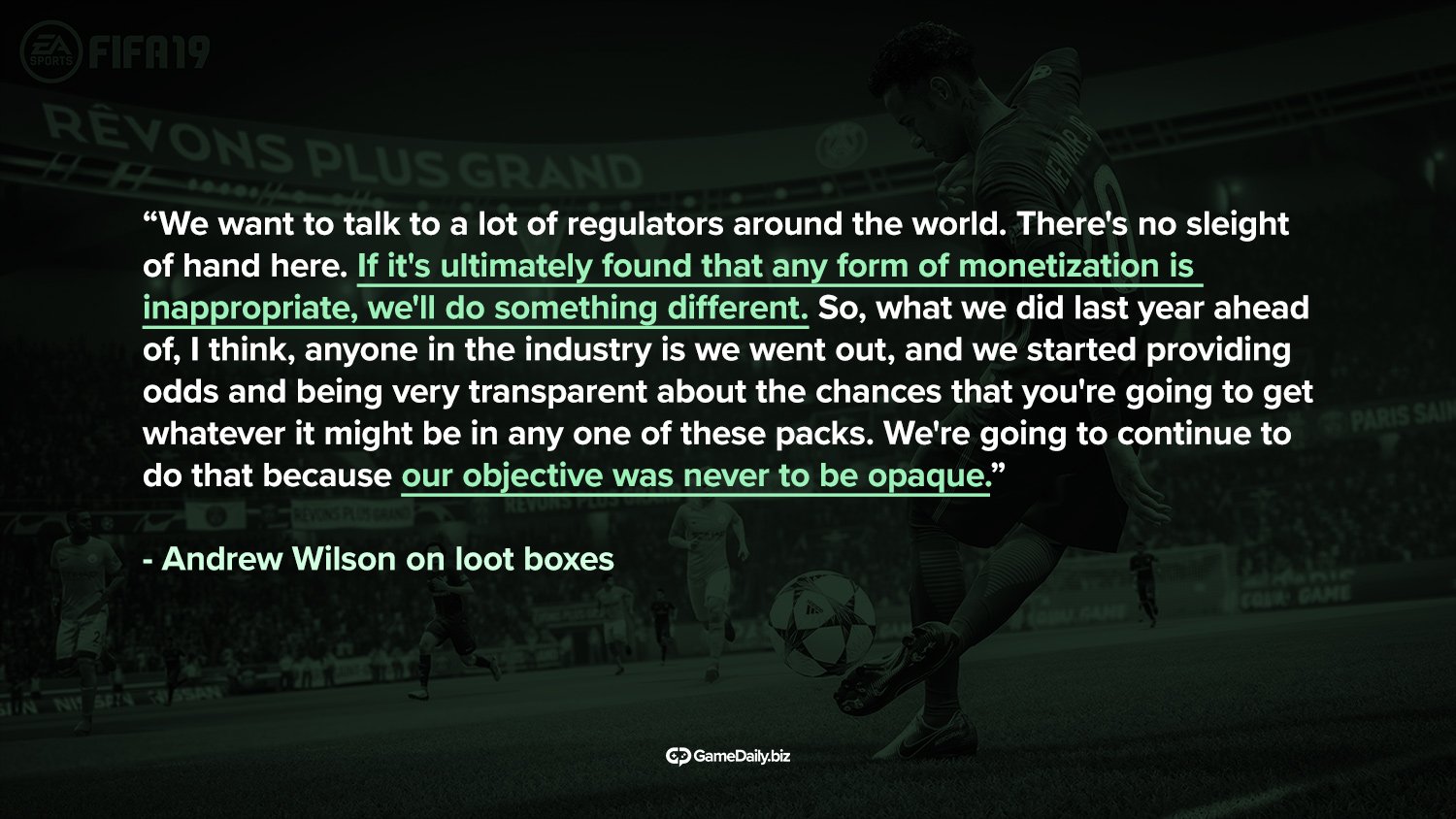
In 2018, Ultimate Team offerings made up the majority of EA’s live service monetization. Part of the allure of Ultimate Team modes in FIFA, Madden NFL, and NHL is a smart synergy between physical sports trading cards and the virtual card pack paradigm. But regardless of how they are presented, Wilson believes that at the core of a successful and fair monetization system is positive value perception and satisfying the core human need to get a deal.
“Whether it’s direct purchase or this mystery box style that’s become commonly referred to as loot boxes we really think about four key vectors: Value, fairness, choice, and fun,” Wilson explained. “We want to feel like we got a good deal. We’ve got some live services businesses that are microtransaction fueled that have some of the highest sentiment and highest engagement in the industry. So, it’s actually possible to do this right.”
Wilson recounted a moment from his youth when the band KISS was selling trading cards. His friends were collectors, but Wilson comes from a religious background, with parents that were wary of the band’s alleged connection to Satanism. He likened the act of purchasing and opening the pack of cards and subsequently trading them with friends to the Ultimate Team players that consumers receive from their digital purchases.
Regardless of how publishers and their customers view loot boxes, some countries are taking a stand against the practice. Belgium and The Netherlands have outright banned blind box microtransactions. South Korea and China allow the practice, but both countries require clear disclosure of odds related to each rarity level that can potentially be pulled from a pack.
The United States is the latest country to face a potential ban on loot boxes. A bill in the Senate has sponsorship from both parties, though it may face an uphill battle in its current form. The process is only just starting, and the wording could change significantly before facing a vote (if it even gets that far). EA and other publishers are keenly aware of the potential threat to their business. Wilson told GameDaily that his company is taking steps to assuage regulator concerns and be transparent with players.
“We want to talk to a lot of regulators around the world. There’s no sleight of hand here,” he said. “If it’s ultimately found that any form of monetization is inappropriate, we’ll do something different. Many territories and many regulators have tested it and found it to be completely fine in the same way that collecting baseball cards or KISS cards is fine. So, what we did last year ahead of, I think, anyone in the industry is we went out, and we started providing odds and being very transparent about the chances that you’re going to get whatever it might be in any one of these packs. We’re going to continue to do that because our objective was never to be opaque.”
Part of the puzzle is engaging parents, especially since the loot box bill currently up for discussion in the United States focuses specifically on children. Wilson and I discussed the challenges of monitoring how our kids engage with media and interact with other players. EA manages its own platform in Origin, but also partners with first-party console manufacturers. Microsoft, Sony, and Nintendo all have their own sets of tools with benefits and complications. Often, there isn’t clear interaction and interplay between third-party software and platform tools.
“We’re going to work harder on surfacing tools so that parents can actually feel more in control of the lives of their children,” Wilson said. “The reality is these tools exist inside of PlayStation, Xbox, and Origin, and other platforms today, they really do. I think all of these platform players have worked hard on this stuff. What we’re going to try to do is actually try to surface that even more in our games, in the language in our games, in the communication around our games, actually use our games to better surface some of those tools so that parents have better control over the digital lives of their children.”
Potential government regulation isn’t the only threat to AAA publishing. The game industry is volatile, with investors demanding greater profits driven by hit games with service-based monetization methods. When tentpole game releases fall short of expectations, the impact can be severe.
Third quarter of fiscal 2019 (ending December 31, 2018) saw EA miss on net revenue by $86 million. Battlefield V didn’t burn up the charts the way the publisher hoped, and the mobile Command & Conquer revival wasn’t a hit. Epic Games’ Fortnite continues to eat up mind-share, though EA has a contender in Respawn’s Apex Legends.
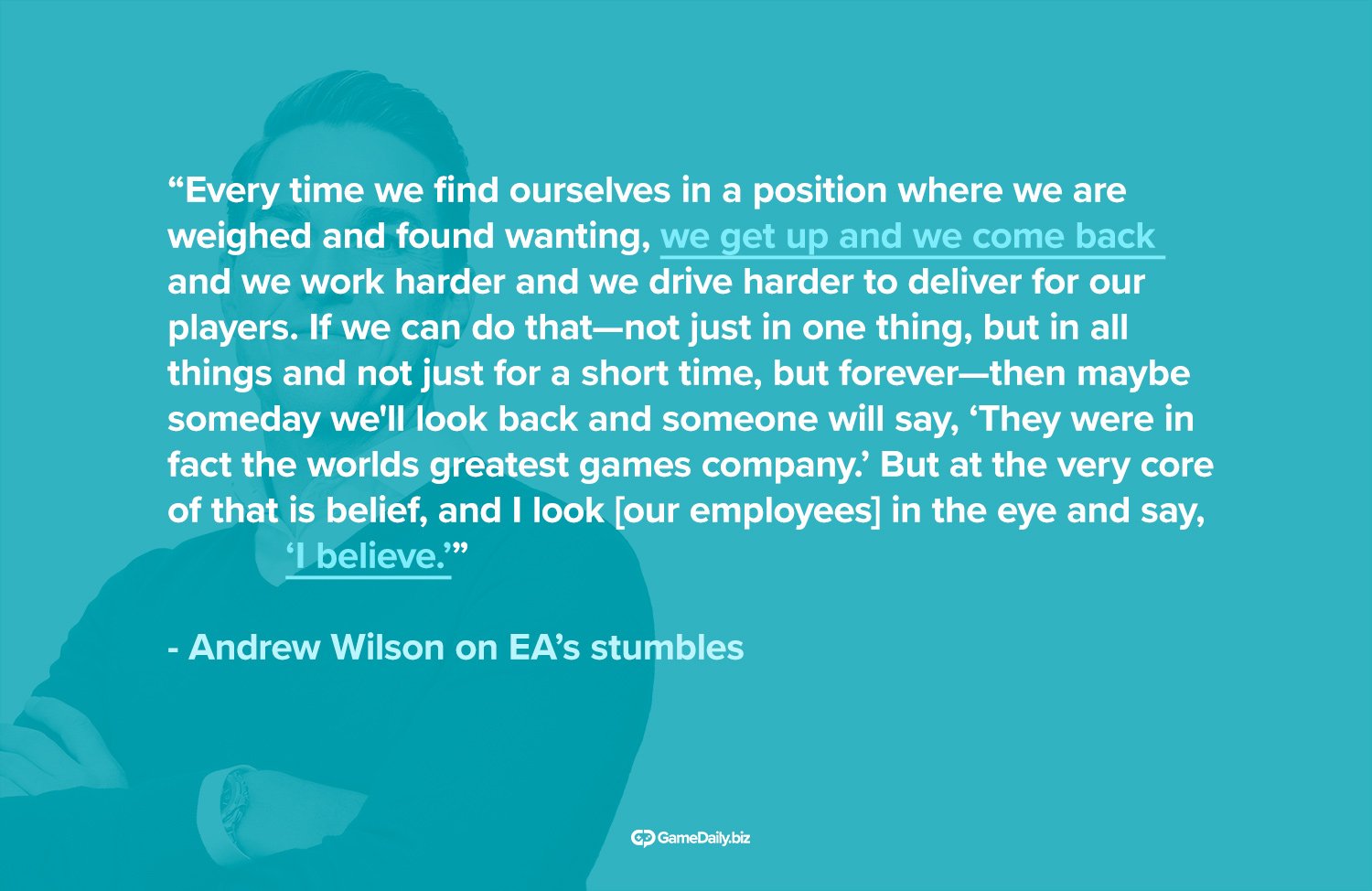
Wilson told me multiple times in our conversation that he was happy the board was letting him continue on his role. The average tenure for a United States CEO is a hair under five years, and Wilson has already bested that. Any time a company hits a rough financial patch, investor eyes turn to the CEO.
“When the board gave me the job… I was young at the time and so they did it on the basis that I had plenty of runway and hopefully I could buck what is the average,” Wilson said. “Part of the reason why I sit down with the board and say, ‘Do I get to keep doing this for a bit longer?’ is because I have this tremendous belief in the organization. It’s really easy as a human being to get dragged down by the commentary on the things that you do. Again, we’re susceptible as an industry, not just EA, but as an industry more than most industries. But trying to help the organization understand that this thing that we want to be which is great, we want to be seen as great by our players doesn’t mean we’ll be perfect, and doesn’t mean we won’t get it wrong.”
This has been his most trying time in his role, keeping morale up even as headlines trumpet the financial shortfall and analysts wag their fingers. Wilson told me he believes in his team, and he has confidence in the steps the company is taking to build a foundation for the future.
“Every time we find ourselves in a position where we are weighed and found wanting, we get up and we come back and we work harder and we drive harder to deliver for our players,” Wilson explained. “If we can do that—not just in one thing, but in all things and not just for a short time, but forever—then maybe someday we’ll look back and someone will say, ‘They were in fact the world’s greatest games company.’ But at the very core of that is belief, and I look [our employees] in the eye and say, ‘I believe.’”
Part of building an EA for the future was making the difficult decision to lay off approximately 350 of the company’s nearly 10,000 employees. Wilson became a target for labor organization proponents like Game Workers Unite and the AFL-CIO. During our discussion, Wilson was contrite when I raised the topic of layoffs.
“I don’t want to try to defend things, but it’s the hardest decision you make as a leader, whether you’re a leader of 10 people or 10,000 people it is the hardest decision you make,” Wilson told GameDaily. “These decisions have to be made for the longevity of an organization who is moving through tremendous disruption as an industry. Any time we make these decisions we really think about it on two core vectors. One is: How can we ensure we’re making decisions for the long term to position us as an organization to do what it is that we do for many years to come and deliver on the promises that we make to our players in what is a fundamentally changing, shifting world with changing, shifting requirements? And then… for anyone who is leaving the company, how do we do that in the most human way possible? How do we work with them? How do we look after them? As a company I think we do pretty good on both of those things, but again, I don’t think there’s anything I can say that makes it feel better for any of the people that are impacted in the process.”
Wilson was more humble in that conversation than I realized. At E3, I had the opportunity to speak with sources currently employed by EA. They provided me with information and evidence that Andrew Wilson and executives that report directly to him had declined their performance bonuses. In 2018, he received a bonus of $2.5 million. It’s not clear how much Wilson and his reports would have been due for fiscal year 2019.
That money was instead deposited back into the bonus pool to be distributed to other employees. This is the second such move EA made to support employees and growth in the past year. When former chief design officer Patrick Söderlund departed the company in August 2018, it was widely believed he took with him a $20 million stock grant intended to convince him to stay on at EA for the long term. That wasn’t the case. Those shares went into a pool used for, among other things, new hires.
Morale is always tricky around layoffs, as even employees that aren’t directly impacted often feel a sense of loss. There’s often uncertainty, which is why Wilson has identified emerging and developing business that will see EA safely into an uncertain future.
Update: An SEC filing dated June 21, 2019 shines more light on the bonuses that Wilson and his direct reports declined in order to provide those funds to the employee bonus pool. In addition to Wilson, chief operating officer and chief financial officer Blake Jorgensen, chief studios officer Laura Miele, chief technology officer Ken Moss, and chief marketing officer Chris Bruzzo participated in this decision.
“Given the Company’s 2019 financial performance, and in order to maintain alignment with our pay-for-performance executive compensation philosophy, our CEO and his staff (including the NEOs) requested that they receive no performance cash bonus award for fiscal 2019,” the filing reads. “The Board (in the case of Mr. Wilson) and the Compensation Committee (in the case of the other NEOs) accepted this request. The bonus funding that would have been allocated to our CEO and his staff (including the NEOs) were contributed to the overall Company bonus pool.”
Based on information provided in the document, the total amount of funds re-directed from top executives to the employee pool amounted to approximately $4.8 million. If there are other employees that are not named in the SEC filing, that amount could be more. Wilson and his reports received performance restricted stock units and restricted stock units in addition to their base salaries (Wilson earns $1,192,000 annually). Those PRSUs and RSUs do not vest immediately, as they are intended to keep an executive engaged and with the company over the longer term.
Game consumers have a complicated relationship with “live service” games (also known as games-as-a-service). The paradigm shift from boxed products to games that evolve and change over periods of years has been an awkward metamorphosis. Players want more: more games, more content in those games, and more value from those games.
However, the ways players think about games, content ownership, and access is a thorny bush rooted in Xbox Live, PlayStation Network, and Discord. Consumers want to have a sense of ownership over their media, but there is also no way to play many of the most popular games without the servers that support them. Players want regular updates, quality of life improvements, and major expansions, but they also decry many efforts to monetize the work that goes into keeping a game running smoothly.
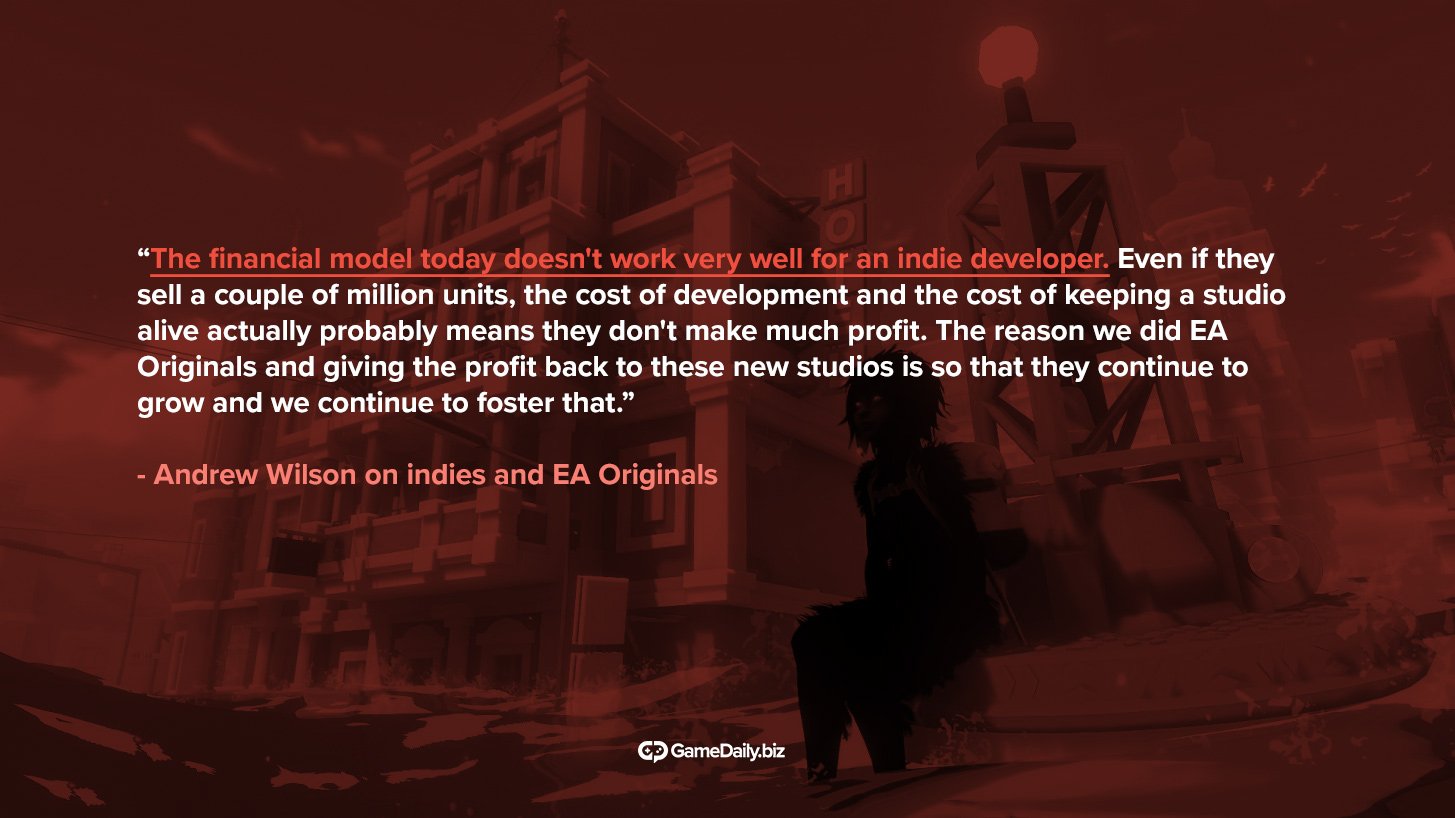
Games-as-a-service isn’t going anywhere. Publishers like EA, with the resources to deliver large-scale live games, will continue to do so, because that’s what players demand. The challenge is that the push toward a consumer base that is “extremely online” has led some to believe that the game industry’s only viable path forward is service-based games. Unit sales aren’t the metric of choice anymore, as publishers and platform holders shift their focus to monthly active users (MAUs).
“Once you get to the point where social interaction is really, really, important, then you discover that network effect in the context of games is as important as it is for Facebook, or Snapchat, or Twitter, or any of these other social grounds,” Wilson explained. “Once you come to terms with that, what you understand is that people will come together to consume this content together and they will want to stay and continue to consume that content and fuel those relationships as part of that. The reality is that is going to mean games as service is going to be foundational to our industry because that is how you will fulfill the motivations of players who have social interaction at the very core of why many of them play games for much of the time they play.”
Linear titles have been successful from first-party studios, where the revenue goal isn’t simply targeting units sold but also how those marquee offerings push hardware sales. Third-party AAA publishers have been shying away from linear games, because they don’t offer the opportunities for recurrent spending, and players aren’t purchasing them at launch the way they used to. The value proposition no longer works for many.
Still, Wilson sees an important role for more traditional game experiences. His focus is on player motivation (the reason people play the games they do), and live games don’t scratch every itch players might have.
“The way we built games 20 years ago actually doesn’t fulfill what has become a very core motivation of why people play today,” Wilson continued. “That’s why games like Star Wars Jedi: Fallen Order and Spider-Man and Uncharted and these types of games will continue to exist because yes, at the very core we want social interaction, and we see how digital media is a prime source for our social interaction today. But we still have these other motivations that we’re trying to fulfill as players. The games-as-a-service concept is likely to be foundational to our future because it fulfills the very core motivation of how we interact as human beings. That doesn’t mean that has to be the case for every game, and it also doesn’t mean that games that don’t embody that at its very core can’t be part of that broader network value that I have as a player.”
So if there is demand for these games at smaller scale and at large scale, the challenge becomes finding a way to make them financially viable. Wilson believes the combination of cloud-based offerings and subscription is an answer that helps fulfill the need.
“The advent of cloud has pretty much been at the center of every disruption of every major industry on the planet over the last five years,“ Wilson said. “The disruption is typically driven across all industries toward access over ownership. Once you get to an orientation of access over ownership, the business model that has risen to the top mostly is subscription. It’s not the only business model, but because of the disruption that cloud creates, the natural run-on effect is that subscription is typically the best business model to account for that fundamental shift in behavior.”
Wilson told me that he hears from people that subscription doesn’t make sense for the game industry. He has been told that the concept of ownership is too entrenched. He suggests that the marriage of cloud-based solutions and subscription are a fit here as they have been in other industries.
Netflix has fundamentally changed the way people watch movies and television. Spotify has altered the way we discover and listen to music. We’re already seeing evidence that subscription holders for Xbox Game Pass and EA’s Origin Access and EA Access programs are playing more games, because the barrier to entry has been significantly lowered.
“The notion that our behavior as players wouldn’t change at the advent of a fundamental cloud disruption—what has been a demonstrated human behavior orientation move from ownership to access and the rise of subscriptions and the best business model to fulfill that—the notion that wouldn’t happen in our industry I think is naïve, and I say that humbly, I think it’s naïve,” Wilson stated.
Despite his confidence in subscription and cloud gaming, Wilson sees that physical media will still be a part of our lives. He tells me that he regularly purchases music on vinyl, for instance. How we decide to purchase games on physical media is changing. We’re moving toward a model that more closely aligns with collecting games for their sentimental importance as well as the content that lives on the media.
Players and developers have suggested that subscription will emphasize live service games, leading to a reduction in focus on narrative-rich, single-player experiences. Wilson sees the opposite to be true, as the value equation shifts back toward these types of games when included in a buffet-style monthly buy-in. However, subscriptions require a constant refresh of the value proposition.
“In the context of games, the best way to do that is to fulfill motivations. While you put forth the proposition that in a subscription you might orient players toward live service games, I would actually say almost the exact opposite. What we’ve come to understand is no human only plays one game, and no human is only trying to fulfill one motivation in the playing of that one game.
“I actually think that games like Star Wars Jedi: Fallen Order will have 30, 40, 50 million play that kind of game in the context of subscription, whereas only maybe 10 or 12 million might have played it absent a subscription. Players will always orient towards the big network live service games because that’s where all their friends are. If you’re making a purchase decision that involves a $60 price point as a friction point, you are likely always going to choose the ones that will fulfill your core motivation, which is social interaction, and you likely will forgo [other] motivations. In the context of subscription, where there is no barrier, you will go and play those games. But more than that it also is a place where we are likely to make more of those games.”
Despite confidence and investment from players like Microsoft and EA, the developer community is terrified that a move toward subscription gaming will snuff out the torch indies are carrying for short, experimental games for a single player. On that point, Wilson offered words of encouragement. He told me the EA is keenly aware of the financial realities of independent developers and that his company’s future includes smaller developers (you can read more about this in our interview with EA’s Matt Bilbey about the EA Originals and EA Partners programs).
“The financial model today doesn’t work very well for an indie developer,” Wilson acknowledged. “Even if they sell a couple of million units, the cost of development and the cost of keeping a studio alive actually probably means they don’t make much profit. The reason we did EA Originals and giving the profit back to these new studios is so that they continue to grow and we continue to foster that.”
As we wrapped up our conversation, I asked Wilson what he was most excited for in the coming fiscal year. He chuckled and referenced a line from The Fast & The Furious, suggesting that while investors view his life one fiscal quarter at a time, he tries not to think in those terms. Instead, he prefers to look at how the industry is going to evolve and how EA will fit into the changing marketplace.
“I think that games are going to permeate our lives much the way digital music does today,” Wilson said. “I listen to music from the minute I get up in the morning to the minute I go to bed at night. I listen to all kinds of music that I would have never listened to before because the cloud, and subscription, and curation has fundamentally disrupted how I listen to music. Our industry, as we move into that realm, is so much more powerful. While someone can share a playlist with me, my listening life is still not that social. While I still talk about the shows I watch as part of Netflix, it’s not inherently social. The playing of games is inherently social, and so I think about the power of what games are, or could be, in that world.
“I’ve been in this industry a really long time and I’ve been through a lot of different transitions, and transformations, and disruptions in this industry. We went from standard def to high def, and single player to multiplayer, and offline to online, and all these things that fundamentally change the way we play games. All of that stuff is exciting, but for me it’s exciting because it’s on a journey to this thing that’s going to be the next fundamental disruption in our industry that’s going to happen in the next three to five years. I’m still young enough to be around to see it.”
This story was updated on June 22, 2019.
 GameDaily.biz © 2026 | All Rights Reserved.
GameDaily.biz © 2026 | All Rights Reserved.